Search engine optimization has leveled the marketing playing field for small businesses. It used to be that as a small business, unless you were really lucky, you had no way to compete with the big guns of your industry. Now, however, with a bit of strategy, a pinch of small business SEO and some hard work, you can muscle your way into your biggest competitor's space.
While big businesses still start with an advantage in SEO, with the right strategy, you can find cracks in their armor and come out on top. Yep, even if you're a startup with a new website.
What is SEO — And What Do I Need to Know to Get Started?
Search engine optimization is the process of making your website rank for desirable keywords in order to bring in search traffic. SEO targets the factors search engines use to rank pages, including:
| Factor | SEO Impact |
|---|---|
| Technical factors | HTML titles, HTML tags, keywords, links, image alt text, website organization (everything from your sitemap to any redirects) and other factors help search engines determine what your site is about. |
| Content quality and quantity | Regularly releasing fresh original content that provides value to potential customers, and updating your pages to boost search rankings. |
| Reputation | If your domain ranks well, and has links to other respected domains, it’s easier to make individual pages rank. |
| Local factors | Small businesses can rank higher in local searches. SEO helps search engines recognize you as a local business. |
Don't worry if this terminology sounds intimidating. You don't have to be a coding genius to learn small business SEO, and the technical aspects are probably easier than you think! This guide will walk you through what you need to know to get started, and we also offer SEO training if you want a more hands-on approach.
What SEO boils down to is creating digital content that your audience wants to read and share. That means researching what your audience is searching for, writing content that answers their questions, optimizing that content with the technical aspects Google likes and attracting boatloads of traffic to your site.
Jump to:
- The ROI of Small Business SEO
- Basic SEO Terms Small Businesses Should Know
- Who is King for Small Business: SEO or Content?
- Why Small Businesses Need Smarter SEO Strategies
- How Much Does Small Business SEO Cost?
- How to Research Keywords for SEO
- Local SEO Checklist
- How to Earn Media Coverage for Your Business
- Refining Your SEO Marketing Strategy
The ROI of Small Business SEO: The Proof is in the Numbers
Trust us here — as a digital marketing company, we're competing with hundreds (if not thousands) of other digital agencies. Some of them have entire departments built around business development and building new relationships with clients.
We don't. Instead, we rely on what we're experts at: SEO. As a result, our site gets over 50,000 highly targeted hits per day – all via organic traffic.
Since we started The Content Factory in 2010, almost every single one of our clients has come through our door via our organic website traffic (the rest, word of mouth via the clients we've obtained via SEO). As of the time of this writing, we rank #1 in search engine results pages for everything from "press release distribution" to "web content writers" to "website rebranding" and hundreds of other highly targeted keywords related to what we do.
If a bigger agency wanted to compete with our online presence by, say, buying AdWords ads, they'd have to spend almost $1 million per year to generate the same amount of targeted organic traffic that our site gets for free via its blog content. We do this for our clients, too.
While we're not going to lie and say that it isn't hard work to build up your SEO game, it's possible for your small business of all kinds to create a killer SEO strategy – and eventually dominate their larger competitors. In this guide, we show you how you can do this for your website, too.
Interested in Online SEO Training?
This guide will walk you through the basics of small business SEO, but for a comprehensive dive into the world of content marketing, see what you'll learn in our Rise & Convert. You can get a free sample lesson when you sign up for our webinar on fixing nine common SEO mistakes.
We've broken our training into six lessons that will improve your keyword researching skills, competitive analysis, content marketing strategy, content writing, website optimization, link building and more. Enroll today!
Basic SEO Terms All Small Businesses Should Know
Here’s a basic glossary of SEO terms you should know to make your website rank higher in search. You can learn more from our SEO basics guide.
Organic search: When you type a word or phrase in Google or another search engine, and click on a non-sponsored link, you’re essentially doing organic search. Google returns two types of information: paid search results (links that are labelled with “Ad” or “Sponsored”) and organic search results (everything else). The higher a page ranks in an organic search, the more likely the searcher will visit it.
Google Answer Box: Sometimes called featured snippets or rich results, the answer box is a small box with an excerpt from a page near at the organic search results that links to that page. Featured snippets usually answer a question or share some basic information about a topic that Google thinks you’ll find useful. Typically, Google also has a separate link to the website in the snippet box on page one in addition to the snippet.
Ranking for a Google featured snippet is great for boosting your traffic (and you don’t have to rank at the top to nab a featured snippet — you just have to answer the question the best in Google’s eyes).

Keyword: A keyword is a word or short phrase that shows a search engine what your website is about. When you perform a search, Google looks for pages that contain keywords relevant to your search. This doesn’t always mean it’ll return results that contain the exact phrase you search for — Google is smart enough to return results that match the intent of your search, if relevant.
Make sure not to overdo it, though. SEO marketers used to use “keyword stuffing” to trick Google into ranking a page by using a lot of keywords, but Google has gotten much smarter, and that technique doesn’t work anymore. To rank for a phrase, you need to write an article that actually provides information people are searching for.
Still, you should be using keywords — and you should spend a significant amount of time researching the best keywords for the content that you are writing.
For example, this article is optimized for the keyword “small business SEO.” We picked that topic because it’s a term small businesses who are looking for an SEO marketing company search for, so we can get business from readers like you. We also use related keyword phrases like “SEO terms” to help the article rank. However, we don’t just stuff those words in — we use them as topics to make the article both valuable to you and appealing to Google.
Read more in our post, What is a Keyword? [An SEO Basics Guide].
Search query: The thing you type into the search box is a search query. The boundary between search query and keyword is kind of hazy. For example, if you Googled, “What is the best electric guitar,” a site that gives guitar advice might try to rank for “electric guitar,” “best electric guitar,” or even the whole search phrase, “what is the best electric guitar?”
You could also get results with titles like “The 10 Best Guitar Brands,” or “The Best Guitars For Beginners.” Google is smart enough to understand those articles provide the information you’re looking for, even if they don’t use the exact same terms.
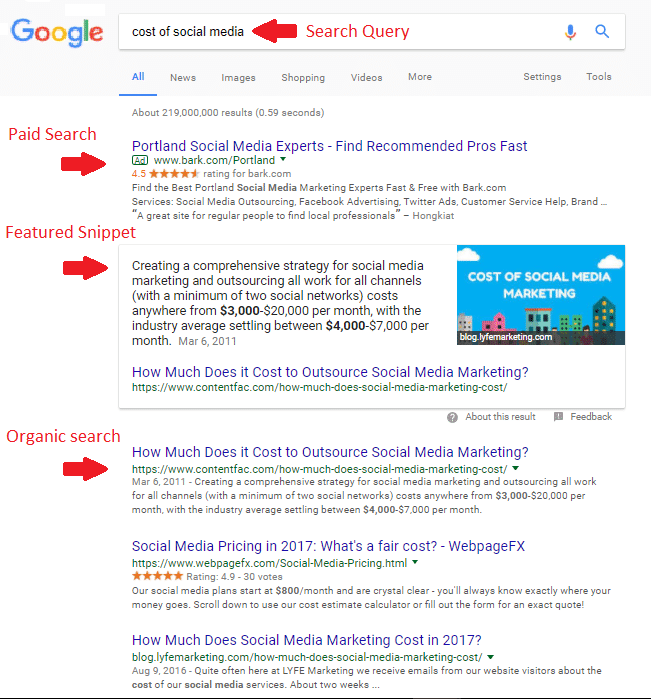
HTML Tags: "HyperText Markup Language" (HTML) is what tells browsers how to display your website. HTML tags divide your page up into different sections, formatted in different ways. From an SEO marketing perspective, the three most important kinds of tags are headers, title tags and meta descriptions.
- Headers: On a webpage, the parts in bigger, bolder letters are usually headers or heading tags. For example, the title you see at the top of this article is an <h1> tag. Below that are <h2> tags, which are used for major subsections of the article. Headings go all the way down to <h6>, but most articles only use the first two or three. The headings help your site visitor find what they need, and also help search engines understand what your article is about. Using strong keywords for <h1> and <h2> tags helps your page rank, and they are particularly useful for small business SEO optimization.
- Title tags: When a website comes up as a result to a search query, the bolder letters at the beginning are the <title> tag. Titles and <h1> tags often use the same text, but it’s actually better to make your titles and <h1> headers different. For example, if your article has a very long <h1>, it’s usually best to shorten it for the title so that it displays properly in search results (about 55 characters is just right, but keep it less than 60).
- Meta descriptions: A meta description is a short blurb that tells both the prospective reader and the search engine what the page is about. In Google results, you’ll see the meta description immediately below the link. Writing good meta descriptions can be tricky. They need to be short (160 characters or less) to fit into the search results, and compelling to get searchers to click your article. They should also usually fit a couple keywords in, without feeling forced.
Internal and external links: Links are clickable chunks of text that send you to another web page. The part of the link you click on (usually underlined and in a different color) is the anchor text. Links are useful to SEO in a couple of ways:
- Internal links (links that connect one page of your website to another) can help boost new pages in search rankings, or show search engines how your different pages are connected. They can also encourage users to check out other parts of your website, which is good for your search results as well as your brand.
- External links drive to pages outside of your website (note: make sure they open in a new tab, so users don't leave your site for good!). Many times, the sites you link to get a notification (pingback) that you reached out to them. Sometimes they'll reward you with a backlink in return, which leads us to our next point...
- Backlinks: When a website links to your website, that's called a backlink, and it's basically the gold standard of SEO. Not only do you benefit from the traffic that site is sending you, but when Google sees that reputable sites are linking to you, it improves your search rankings.
SEO and Content for Small Business — Who is King?
If you’ve spent some time reading about small business SEO and content strategy, you’ve probably come across the phrase, “content is king.” It’s a favorite cliché among marketers (we’ve said it ourselves) that dates back to a 1996 article by Bill Gates about the future of the Internet. His original thesis was prescient: “Content is where I expect much of the real money will be made on the Internet, just as it was in broadcasting.”
Gates predicted that content from software, essays and interactive media would be a crucial part of how business worked online, and he was right in ways he probably didn’t even anticipate. Twenty years ago, who could have guessed that every hardware store, doctor’s office, plumber and accounting firm would be publishing their own articles and courting followers on social media?
But it’s an easy phrase to misinterpret. A lot of companies think content works like this:
More content = more views = more leads = more money.
But not everyone can be king, and not every piece of content can boost your search engine results. In fact, lousy or ho-hum content can actually hurt your search rankings and drive away leads. Content works when it connects with your audience. It needs to be well targeted and well-written.
Small Business SEO is Especially Vulnerable to Lousy Content
The irony of Bill Gates coining the phrase “content is king” won’t be lost on anyone who has ever tried to find information on Microsoft’s website. Finding documentation or even comprehensible feature lists can be a nightmare, but even on basic usability (which is extremely important for SEO), Microsoft fails. Here’s what you see when you surf onto the Microsoft homepage:
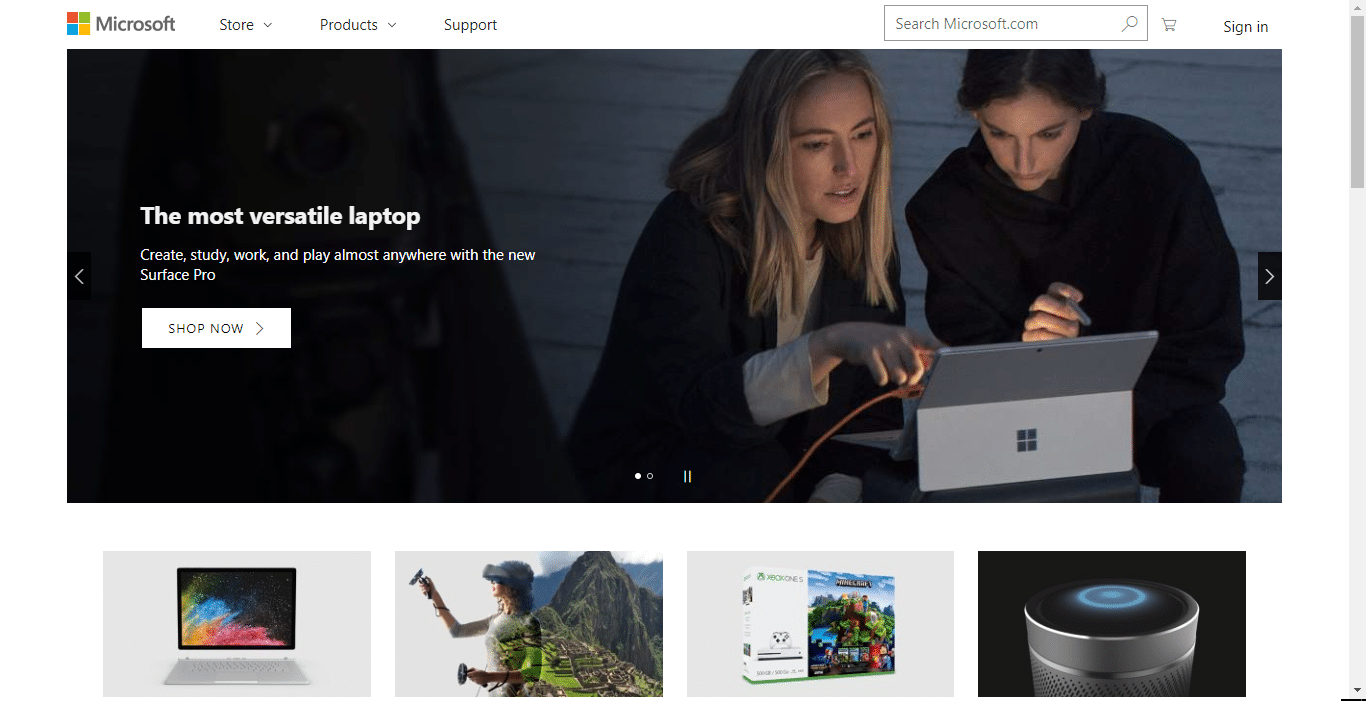
This is on a PC, not a mobile device. There’s a lot of screen real estate there. They could have filled it up with the laptop ad at the top entirely, or split it between that image and the other 4 image links tiled at the bottom. Instead, they have the laptop ad and most of those tiles displayed, except they cut off the bottom and the description so you have to scroll to even figure out what’s going on at the bottom of the screen. It goes on like this:
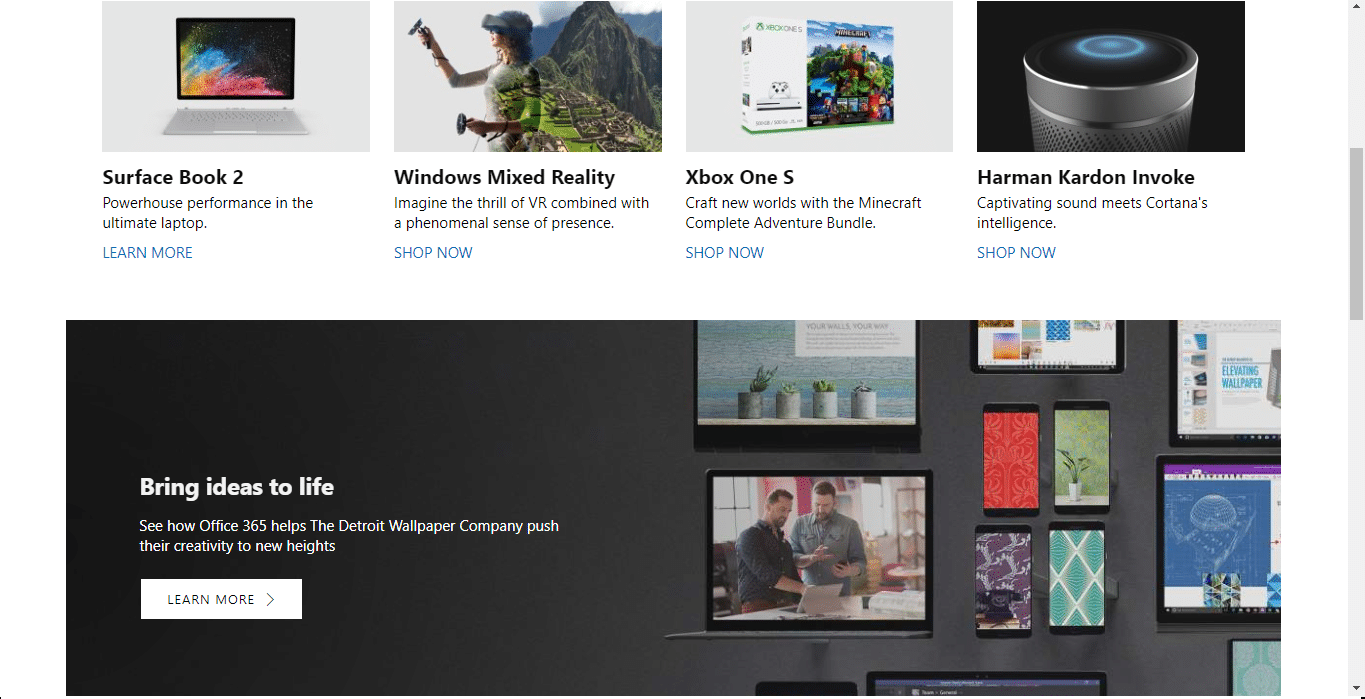
... and on

... and on

...and on
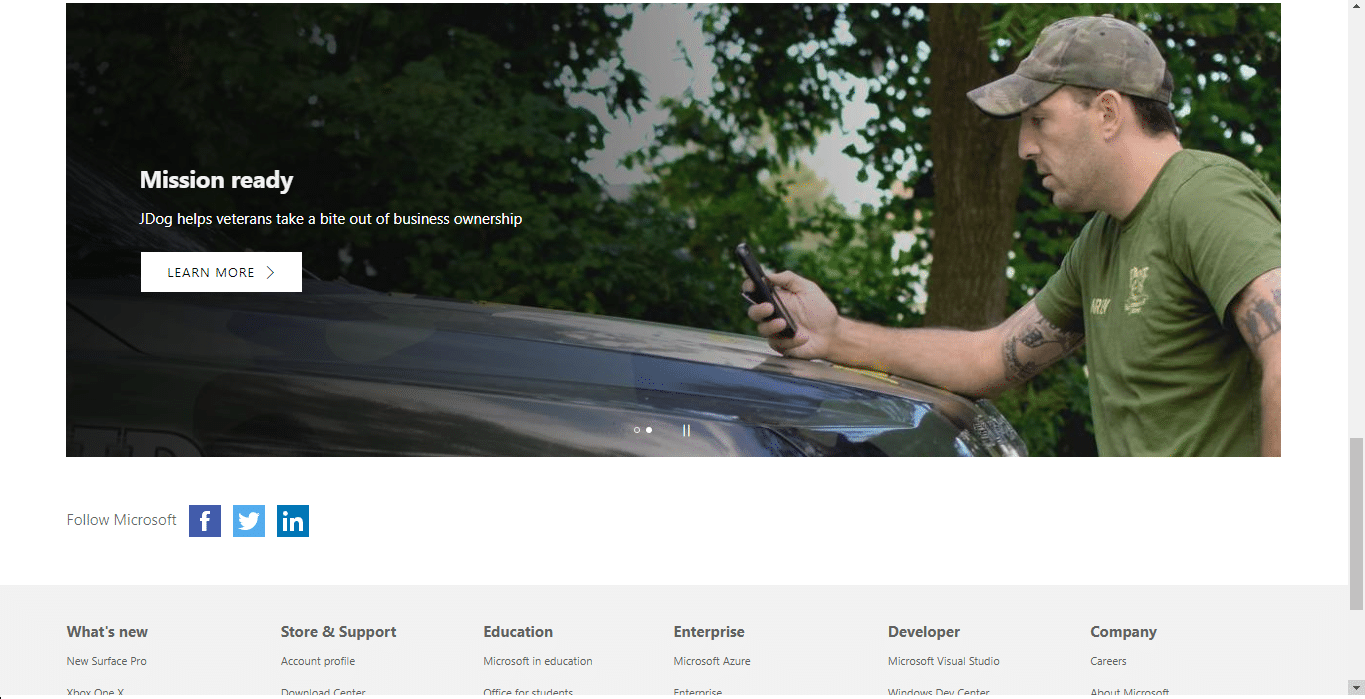
Even the order they have things in is bizarre. No disrespect to JDog and their work with veterans, but that’s a human interest story — if you’re going to put it on the homepage, put it at (or near) the top where people can read it for fun when they surf in.
By the time someone has clicked all the way to the bottom of this page, they’re not going to be interested. Things are even worse on mobile, with 11 separate images stacked, one on top of the other.
This is the kind of homepage companies build when they don’t want to make decisions. They put everything on page one with big images, and figure that their users will somehow find their way to the info they need.
If things were fair, this kind of cluttered, poorly-designed page would be pushed down in the rankings, but Microsoft is doing just fine (Alexa ranks their page 49th worldwide at the time of writing). And Microsoft isn’t alone.
A lot of big companies that should know better have home pages with SEO, content marketing and web design that ranges from lousy to unspeakable, but somehow get away with it. Often, many small businesses see pages like this and think that they too can get away with this. But let’s be honest, Microsoft’s page ranks well because they are Microsoft — and realistically, they could get away with almost anything.
Small Businesses Have to Have Smarter SEO Strategies

https://www.freepik.com/premium-photo/antwerp-street-belgium_8803116.htm#query=main%20street&position=7&from_view=search&track=sph
If you’re running a small business, it’s fair to say that you don’t have the same cash to spend on advertising and marketing that Microsoft does. You can’t attack the market with an all-out blitz, or get a link shared on every major news publication in the world with a single press release.
Instead, you have to have a targeted, efficient strategy that zeroes in on your customers. This means prioritizing a few high-value keywords, or buying a few budget-friendly ads. The big companies can throw a lot of content out there and see what sticks — small businesses can’t.
And because they’re big, many big businesses have built-in audiences who will search for their stuff and put up with bad content and design. That traffic counts for a lot in SEO. It also creates positive feedback. When you get more search traffic, you get more keywords ranking in Google search, which gives you more business and more traffic, which gives you better rankings.
They can also channel their resources and authority into building backlinks, which is huge. Usually, when a company like Microsoft has an interview with a reporter, a product review in an industry magazine, or a guest blog on an affiliate site, that content is linked to their website. Google counts those links as a vote for Microsoft’s site, and getting a lot of “votes” from other sites that rank well helps your site rank well.
And even if they put out lousy content, it doesn’t hurt them much — in fact, if it’s bad enough to become news, it could get some links and traffic, which means more SEO.
It may not be fair, but small business SEO operates by a completely different set of rules.
New businesses often won’t show up in page one of Google SERPs for anything with the possible exception of some local searches or branded searches (a search for your brand name or the name of a product or service you offer). Without those ranking keywords, it’s harder to get traffic, which makes it even harder to get more keywords.
And you’re not automatically the talk of the town — you have to get out there and hustle for those links.
You can climb up with good SEO and content marketing, but it has to be consistent. You can’t just spew out blog posts about everything you do and hope traffic pops up. You need to show Google you have authority in an area by targeting a precise range of related keywords and topics.
And you won’t get away with poor organization or bad website design the way some large companies can. If your quality starts slipping, you can start to slide right back down in search.
We’re not trying to discourage you — companies succeed in small business SEO all the time. If you didn’t have the drive it takes, you wouldn’t have started your own company, right? But you can’t afford to assume search engine optimization is the easy part, because it’s not.
How Much Does Small Business SEO Cost?
The short answer is, it depends what you want and how you do it. The cost of SEO services for small businesses can vary a lot depending on factors, like:
What content do you need?
You probably need your landing page revamped at the very least. Creating good, SEO-optimized copy in the voice of your company takes a lot of work. Most companies benefit from regular blogging as well. You’ll need press releases to bring in traffic and links, and you may need email newsletters as well.
The Content Factory charges $1 per word, which works out to about $2,000-$4,000 for your landing page. Prices among other SEO marketers vary a lot. Some companies charge ten times as much as we do. On the other hand, there’s probably someone on Craigslist who will promise to do it all for $100, but at that rate you can’t expect much. Check out How Much Does Professional Web Content Writing Cost? for more info.
Do you need social media?
There’s a simple rule we tell clients when it comes to social media: do it right, or don’t do it at all.
That means you should update regularly, write posts that create conversation with your audience, and get back to people quickly when they send you comments or messages. You also always need to be churning out content that’s useful or amusing in some way.
Much like website or blog content, if you aren’t giving some value to your audience, well, you won’t have much of an audience. Social signals are important for SEO — while social isn’t something that works for every company, if it fits for your company, it’s an absolute must. At TCF, we can manage three social media channels starting at $4,000. Same as with content, prices for different agencies vary.
Will you do any of it yourself?
SEO takes a lot of time, and good writing skills, but that doesn’t mean you can’t do any of it yourself. Many companies (including TCF) will provide you with all the tools and knowledge you need to start improving your businesses SEO.
That said, it’s important to be realistic with yourself. You may not have the writing skills to create a top notch blog, and you probably don’t have the time to do all your content. If you’re on a tight budget, you may want to take a hybrid approach. For example, you could write one blog a week and outsource SEO optimization and other content to a partner.
How to Research Keywords for SEO
Keyword Research is the key to creating an effective SEO content strategy. The first step is making sure your page doesn’t have any glaring technical SEO problems that might be hurting your Google search results. Head over to SEOSiteCheckup, and enter your URL. It will scan your site for broken links, SEO-unfriendly URLs, and other common issues. It’s free, user friendly, and doesn’t miss anything (although it does occasionally throw up false positives).
Now, it’s time to dive into the keyword research. We recommend SEMRush for beginners because it’s easy to use and very thorough, but its freemium model means you’ll probably want to fork out for a membership at some point. With that said, you can get a month of SEMrush Pro free by clicking this affiliate link.
Enter your URL in the dashboard, and you’ll get a ton of info, including monthly organic and paid search traffic, backlinks, ranking keywords and competitor comparisons, among other data.
Now, click on the Top Organic Keywords tab, and check out the Organic Search Positions list. This will show you the keywords you’re already ranking for:
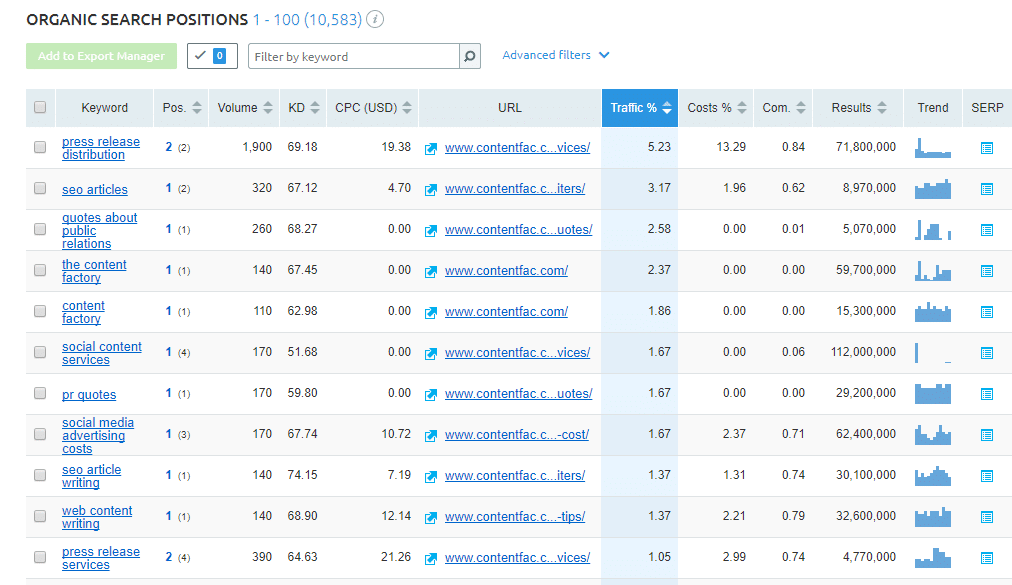
Now, click Pos. to rank your keywords by position. Do you have any keywords in the top 10? Top 20? If you do, how valuable are they to you? CPC (cost-per-click) shows how paid search costs for that keyword, which can help you estimate its value for you.
Volume is another important factor. The higher the volume, the more searchers are going to see your page when they Google that keyword.
With that said, high CPC or volume doesn’t necessarily mark a keyword as valuable to you. Keyword research is heavily dependent on industry, location and many other factors. Check out this keyword, for example: “French restaurants in Michigan.”
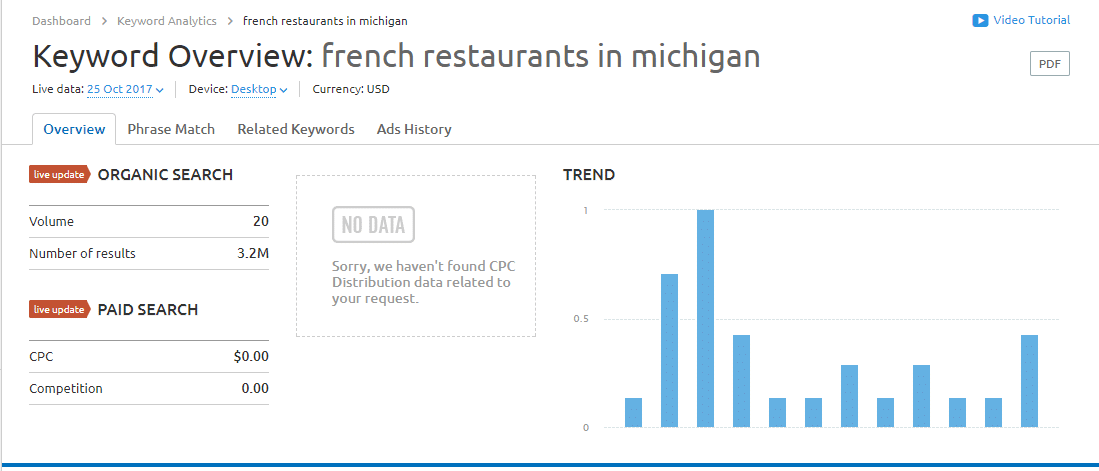
It’s lousy, right? Worthless CPC, and just 20 searches per month. However, if you run a French restaurant in Michigan, that could be a great target. There’s low competition, and it’s very targeted — anyone searching for it is a potential customer.
Set aside a few hours to get a list of keywords together. Ideally, you want to target keywords that have good volume, are relevant to your business, and have a high potential for conversion (in other words, if you sell cloud hosting, you probably want the keyword “cloud hosting prices,” but not “how cloud hosting works”).
Look for patterns in the keywords that you can use to form a content strategy. For small business SEO, it’s usually best to narrow your focus, and concentrate on a few topics that are already bringing customers to your website. Keep your business model in mind. A brick and mortar store will probably get more value out of local terms than, say, an app developer serving a nationwide industry.
Check out Keyword Research Revealed: How to Find Keywords in SEO for more information.
Local SEO Checklist

https://www.freepik.com/premium-photo/male-businessman-hand-hold-silver-pen-make-green-check-mark-closeup_8794899.htm#query=checklist&position=5&from_view=search&track=sph
Unless you’re doing business completely online, you really don’t want to ignore local SEO. Fortunately, there are some easy steps you can take to get Google to notice your local business and start sending traffic your way. Basically, it mostly comes down to filling out some forms to make sure you’re listed in all the places you should be.
1. Check the Moz Local search page.
Moz Local is a great tool for figuring out if your local presence is properly set up. When you enter your company name and Zip code, it will check to see if customers can find you on Google Maps, Foursquare, Yelp, Facebook and a bunch of other listings.
2. Create and optimize your Google My Business page.
Google My Business (GMB) is another useful tool to manage your online presence, and it's tailor made for local businesses. As you can imagine, Google prioritizes its own products in search, so GMB is a must-have for any small business that wants to improve its SEO. Keep in mind that competitors may be able to edit your listings, which could harm your business (in other words, make sure you’re keeping an eye on them!).
Claim and verify your page, add your company's description and services, share out content at least once a week, include plenty of great looking photos and infuse the keywords you researched into the copy — SEO counts for GMB, too!
Check out How to Completely Optimize Your Google My Business Listing for more great GMB tips.
3. Get involved with local events.
Is there a local neighborhood or city page that profiles businesses like yours? Could your local Chamber of Commerce help you connect to the community? Should you target events like Small Business Saturday or local festivals?
4. Add your small business to local directories.
Again, backlinks are the backbone of SEO, and local directories can be a great source of backlinks to your website — provided they're also reputable directories. Look for names you recognize, and research the directory to double-check that it's not a spammy link network.
You can start with this list of 57 online local business directories from HubSpot.
5. Step up your social media marketing game.
A good social media strategy plays a big role in SEO for small businesses. By growing your social following, you'll be driving more traffic back to your site, which will in turn improve your search rankings.
Here are a few ideas:
- Tweet about the local small business festival, with a special promotion for your followers.
- Congratulate the high school football team for making it to the state championships, or share inspiring local news.
- Volunteer for a local community service day, and share your story on Facebook.
- Mention the local weather (@ your meteorologist!) and share photos of what your business looks like on that sunny/ snowy/ rainy day.
- Get on Yelp (if you have a cool head!), thank new customers and respond graciously to any negative reviews.
These marketing strategies aren’t just a way to build customer loyalty — they pay off in SEO too! Google will see the love you’re getting from your neighborhood, and boost your visibility in the search engine results pages (SERPs).
How to Earn Media Coverage for Your Business

https://www.freepik.com/premium-photo/woman-reading-news-articles-mobile-phone_10487923.htm#query=breaking%20news&position=14&from_view=search&track=sph
Getting reporters to cover your brand (AKA, generating "earned media coverage") isn’t just free advertising — it’s also a great way to boost SEO for small businesses. As mentioned earlier, when well-established sites link to you, it drives up your PageRank, helping you rank for more terms. It also dovetails with your local SEO strategy, building buzz (and search traffic!) around your brand.
One of the best tools for getting earned media coverage is HARO (Help a Reporter Out – check it out, it's free).
When a reporter or blogger wants a source, they write out a query and send it to HARO, which sends them out as an email list.
If you fit the bill, you can respond as a source through HARO, score an interview and get some coverage. That’s it! You won’t get picked every time, but if you’re careful about finding queries that could use your expertise and experience, and you take your time to write a good pitch, you will get picked.
In one month, we sent out 21 HAROs, and got quoted in 6 major outlets — a 28.5% success rate. Additionally, two of those articles were syndicated, for a total of 11 backlinks. That’s more than one major backlink for every two pitches sent out.
Those links did great things for our SEO, but the results weren’t really that surprising. Getting hits on about 1 in 3 is pretty standard, if you know how to write HARO pitches. Here are three tips:
- Pitch a story: Journalists and bloggers are on tight schedules. They don’t have time for “I have a great idea! Contact me to learn more!” Get straight to the point and write out what you want to tell them. Then, they can contact you if they want to learn more.
- Be succinct: Don’t count on them reading two pages of your adventures as a small business owner. Write a short greeting, then get to the point. Make sure you have a tight first paragraph that shares everything they need to know. It’s alright to go longer if it fits the query, but they shouldn’t have to read more than a few sentences to get the point.
- Dot your I’s and cross your T's: Make sure your contact information is correct, and carefully edit your pitch. You may want to get someone to look over your spelling, punctuation and organization to make sure everything is in order.
Reporters still not using your responses? Check out our guide here to help fine-tune your strategy.
Refining Your SEO Marketing Strategy
Small business SEO success doesn’t come overnight. It may take six months for your blog posts to start gaining traction and traffic. Be patient, and keep your eyes open.
One thing you’ll want to do is set up a Google Analytics account to track your success. Google Analytics records everything that happens on your site. You’ll see how many visitors you’re getting, what pages are attracting the most search traffic, how long they’re staying on your site and more. Traffic can wax and wane, but over a few months, you’ll get a good baseline view of your audience behavior, which you can use to benchmark your SEO performance.
Ironically, Google Analytics doesn’t tell you directly how Google views your site, although it does tell you what visitors are coming from Google searchers. You’ll want to complement Google Analytics with a tool like SEMRush to track your SEO performance.
Plan to check out how your site traffic and SEO are doing at least once a week. You can learn exactly how to do this with our Analytics Cheat Sheet.
Contact the SEO Pros at The Content Factory
Finally, don’t be afraid to ask for help. Whether you’re looking for a complete marketing program, or just someone to help tweak your in-house strategy, we’d love to bring your business the audience you deserve. contact us to learn more.
Are you a female small business owner who wants to learn more about SEO? Join our Sisters in SEO Facebook Group to get answers to all your small business SEO questions! We have search marketing divas from novice to pro participating, so you can get expert insights while networking with other women in business.



An all in one post and all important points are mentioned here. Small businesses still lack in online marketing budget and especially on organic marketing which doesn’t get results immediately. They do need sales immediately and that is very much valid for small businesses.
But at the same time they must put something for long term results as well, and SEO & content are really important here. Executing these need skill, attention to the smallest things, and results need time. But once these two start getting results that can not be matched by any other forms of marketing.
Regards
Soumya Roy
Founder & Lead SEO Trainer
PromozSEO.com
Content is king, context in queen. Microsoft seems to fail… a lot, nowadays. Great actionable tips for improving SEO– nice post!
I’ve been curious about how small business can compete with bigger companies. I can see how SEO can benefit small businesses. It sounds essential after you mentioned how new companies don’t tend to show up on a search if they don’t do SEO.
Small businesses still lack in online marketing budget and especially on organic marketing which doesn’t get results immediately. They do need sales immediately and that is very much valid for small businesses.
I’ve been curious about how small business can compete with bigger companies. I can see how SEO can benefit small businesses. It sounds essential after you mentioned how new companies don’t tend to show up on a search if they don’t do SEO.
Nice post
Great its really useful tips for local ranking. Will apply all these method on my website hope i get good result.
I love this article so much I shared it everywhere and bookmarked it in my browser so I can refer to it now and then. Thank you!! Following you now on Twitter.
Thanks, Caryn! We gave you a follow back 🙂
Thanks for sharing small business seo information it’s very helpful for me.
Nice intro for beginners. It must be an important milestone for me when I can read a “guide to beginner’s SEO” and actually feel like I’m progressed past this! I’d like to expand upon your advice that high volume or high CPC isn’t ALWAYS the ones you want to target, especially if you are a beginner.
Sometimes, niche is good. It helps you when you’re doing market pain point analysis – finding things that aren’t there.
Lastly, LOVE that you included HARO! I initially worked in public relations before I switched to SEO, and I quickly realized both industries overlap. If you’re getting press (even if it is traditional media and not directly related to LINKS), you can hit a goldmine for building website traffic. It’s easy to have blind spots when you are 100% focused on digital media.
Do you need social media? YAAAASSS!!! This is a huge pain point we see small business clients not utilizing. I think this covered a lot of the beginner’s questions about SEO, but one thing really stood out to me and that was the statement to go after a few of the big keywords. I’m not too sure about that one. You really would have to have a huge spend available to compete with a large company and most small businesses come to us with hardly any SEO budget, much less one that can afford to include main keywords in their strategy. However, if you go after low hanging fruit it can muscle you in those rankings just as well for a fraction of the cost.